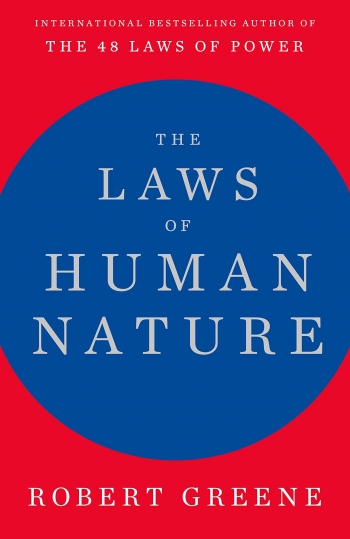
2 Sentence Summary
In The Laws of Human Nature, Robert Greene explores the deep motivations that drive us, offering valuable guidance from influential figures throughout history. This book is brimming with practical life knowledge that can easily be applied.
Summary Read Time: Less than 7 minutes
Actual Book Length: 624
First Published in: 2018
There are 10 key ideas from the book The Laws Of Nature which are:
1: Irrational behavior is a common human trait.
2: All of us exhibit some degree of narcissism, but actions rather than appearances define character.
3: Work on your character and turn selfish actions into benefits.
4: We all may fall into short-sightedness and defensiveness.
5: Stop Hurting Yourself: Stay positive and don’t bottle up feelings.
6: We all tend to feel superior at times; let’s keep it grounded.
7: Actively resist gender bias and foster a sense of direction.
8: Avoid falling into the traps of collective mindsets and false privileges.
9: Turn natural aggressiveness into constructive actions.
10: Value generational wisdom and accept the reality of death.
Below is the detailed yet quick summary of the book covering each idea:
Idea 1- Irrational behavior is a common human trait.
As much as we pride ourselves on being rational, modern humans often base decisions on emotions, leading to irrational choices. This internal tug-of-war between emotions and rationality dates back to ancient times, exemplified by Pericles, an Athenian statesman from the fifth century BC. During a period of impending Spartan attack, Pericles encouraged restraint, persuading leaders to avoid rushing into war. However, when a plague hit Athens, causing Pericles’s demise, emotional responses prevailed, culminating in a devastating, prolonged war.
Pericles’s wisdom hinged on patience, a quality we need to cultivate to rein in our irrational tendencies. When faced with vital decisions, he would retreat to his home for calm contemplation, considering all potential ramifications before deciding. This method aimed for the collective good, rather than the interests of only the elite or influential. Increasing our reaction time, not making decisions in emotional haste, and acknowledging the possible biases influencing our decisions are practices that we should emulate.
Biases, such as confirmation and conviction bias, often skew our judgement. While the former sees us seeking information that bolsters our preconceptions, the latter convinces us that the intensity of our emotions equates to truth. To counteract these biases, we should adopt skepticism, analytical thinking, and openness to diverse views. Balancing our emotions with rational thinking also aids in making sound decisions, aiming for calmness rather than emotionlessness.
Idea 2 – All of us exhibit some degree of narcissism, but actions rather than appearances define character.
Contrary to the misconception of narcissism implying self-love, many deep narcissists grapple with the absence of a well-defined self to love. Developing a wholesome sense of self can lead to healthier levels of narcissism, mitigating insecurities and fostering higher self-esteem.
Furthermore, deep narcissists often lack empathy – a critical tool for understanding others’ experiences and refining one’s character. Recognizing that people often portray an idealized self, we must remember that true character is revealed in adversity, cooperation, and adaptability, not just appearances. As Shakespeare aptly put it, “All the world’s a stage.”
Idea 3 – Work on your character and turn selfish actions into benefits.
Each one of us possesses a unique blend of strengths and weaknesses, some genetically inherited, some instilled through upbringing, and some acquired over time. Even attributes like aggression levels, which research suggests may be genetically determined, are not set in stone; they can be harnessed and managed. Our inherent traits need not confine us; instead, they can be leveraged to our advantage.
A crucial step towards self-improvement is acknowledging these characteristics, accepting them as facets of human nature, and assessing them honestly. For instance, a hyperperfectionist, rather than battling her natural tendencies, could seek roles that allow her full control, negating the need for delegation.
Envy, another universal human trait, is often overlooked, as admitting to it feels like acknowledging one’s inferiority. However, our envious nature has biological underpinnings; we are innately competitive, equally driven by real-world desires and imagined ones. Rather than suppressing or denying envy, accepting its ubiquity can enable us to utilize it effectively. Recognizing our inclination towards what’s elusive, we can cultivate an aura of mystery about ourselves, stoking others’ curiosity and fascination, using the very traits we covet in an empowering way.
Idea 4 – We all may fall into short-sightedness and defensiveness.
It’s human nature to react more urgently to immediate concerns rather than distant threats, explaining why terrorism often garners more attention than global warming. This instinct traces back to our survival-centric ancestors, who focused on immediate necessities like food, water, and safety from predators. For optimal performance, recognizing this short-sighted tendency is critical.
A more farsighted approach is beneficial, requiring us to step back, consider options, and anticipate potential consequences. Understanding that today’s issues often stem from past actions can also enhance decision-making. Notably, sometimes inaction, often seen as weakness in Western culture, can be strategic and wise.
Human nature also incorporates a degree of defensiveness, driven by our intrinsic value for autonomy and free will. A productive way to navigate this trait is by making someone feel they’ve originated an idea that aligns with our goals. This involves acknowledging their individuality, intelligence, and appealing to their stubborn nature.
Idea 5 – Stop Hurting Yourself: Stay positive and don’t bottle up feelings.
If you often feel trapped in a cycle of failure, it’s crucial to recognize and manage the detrimental traits that lead to this repetitive negativity. By introspecting and identifying the root causes of recurring adverse outcomes, you can shift your course and prevent future misfortunes. Notably, a negative attitude often fuels self-sabotage, but it’s a trait you can change.
The story of Anton Chekhov, a celebrated playwright, exemplifies the transformative power of perspective and empathy. Despite enduring a difficult childhood marked by abuse and abandonment, Chekhov didn’t succumb to pessimism. Instead, he developed profound empathy for his father, recognizing him as a lost, helpless man victimized by his own upbringing.
This understanding, leading to forgiveness, liberated Chekhov from anger. It’s essential to release negative emotions like anger and worthlessness to avoid self-imposed imprisonment. Acknowledging any dark aspects of your personality, often referred to as the “shadow self,” is the first step to channeling them positively. Ignoring these feelings, as illustrated by former US President Richard Nixon’s downfall, can result in harmful outbursts and damaging consequences.
Idea 6 – We all tend to feel superior at times; let’s keep it grounded.
You’ve probably observed individuals becoming overly confident as success propels them into losing sight of reality, a phenomenon known as the Law of Grandiosity. Consider the career of Michael Eisner. He transitioned from a successful TV executive to Paramount film studio’s chief, he led the studio to unprecedented heights. His later role as Disney’s CEO saw him revitalize the brand with fifteen blockbuster movies and strategic use of the back catalog in the home video market. Unfortunately, Eisner began to believe everything he undertook would turn into gold.
His subsequent endeavors, however, were marked by considerable failures. His ambitious Euro Disney project in France underperformed, and Disney’s internet portal, Go, hemorrhaged money. Eisner’s denial of his mistakes became evident when he shifted blame, notably by firing Jeffrey Katzenberg, a key contributor to Disney’s recent successes.
His actions led to litigation, damaged relationships with industry peers, and a plummeting stock price, resulting in his ousting in 2005. Eisner’s initial understanding of the American audience did not extend to European preferences or the internet service industry, leading to his downfall.
Idea 7 – Actively resist gender bias and foster a sense of direction.
Caterina Sforza, born into Milan’s powerful dynasty in 1463, deftly embraced both masculine and feminine traits. It captivated her society and set a precedent mirrored by modern artists like David Bowie. Harnessing this dual nature fosters empathy, creativity, and confidence, and enhances problem-solving abilities.
Finding a higher purpose can also be transformative, offering a compass amidst life’s complexities. Such purpose often emerges from a defining childhood moment or later, as with Akira Kurosawa’s film epiphany. Pursuing these pivotal experiences, which point to our higher calling, is crucial in life. Success can easily make one forget the roles of mentors, teammates, and timing, so it’s crucial to remain realistic about personal strengths, limitations, and contributing factors.
Idea 8 – Avoid falling into the traps of collective mindsets and false privileges.
Despite our modern self-perception, humans inherently tend to worry about social approval and group conformity, often reverting to primitive, group-centric thinking. This is exemplified by the Chinese Cultural Revolution under Chairman Mao Zedong. Aimed at countering elitism, the revolution spiraled into chaos with anyone resembling Western fashion targeted as ‘elite’. Instead of dismantling unfair hierarchies, it ended in a police state, the very opposite of its original goal.
To curb such devolution, we should foster what the author calls a ‘Reality Group’, emphasizing teamwork and maintaining focus on the goal while preventing power plays and disputes. In tandem, we should eschew the sense of entitlement, exemplified by royalty, which can cause resentment. Queen Elizabeth I understood this and chose to earn her subjects’ respect by refusing personal income, aiding the public, and making people-centric decisions. In emulation, we too should strive to be admired by displaying hard work, responsibility, and selflessness.
Idea 9 – Turn natural aggressiveness into constructive actions.
In the 19th century, Maurice Clark unknowingly partnered with a seemingly modest John D. Rockefeller. Rockefeller’s troubled upbringing fueled an obsession for stability and wealth, a fact Clark remained oblivious to, leading him to sell his shares to Rockefeller. This maneuver paved the way for the creation of the influential Standard Oil Company.
Everyone harbors some aggression, a trait instrumental in human evolution. However, suppressing it can lead to passive-aggression or self-directed resentment. Instead, acknowledging and directing this aggression towards productive endeavors is a healthier approach. Whether it stems from insecurity, controlling parents, childhood trauma, or a need for control, understanding the roots of our aggression can assist in channeling it positively.
Furthermore, understanding aggression’s intricacies allows us to recognize it in others, hence revealing their vulnerabilities. As such, we can not only outwit but also overcome aggressors, leading to one of life’s most rewarding victories—triumphing over a bully.
Idea 10 – Value generational wisdom and accept the reality of death.
According to 14th-century historian Ibn Khaldun, generations revolve in a four-part cycle—revolution, stability, comfort, and inquiry. Observing the 20th century in the US, we see the Silent Generation adopting conservative values post-Great Depression and World War II. They gave way to the counterculture-fueled Baby Boomers, who in turn were succeeded by the pragmatic Generation X. Lastly, the Millenials prized teamwork and opposed confrontation. Understanding generational influences on decision-making is crucial in our interconnected world, offering insights into global trends and future zeitgeist.
Another significant factor shaping our decisions is our awareness of mortality. While it may seem counterintuitive to ponder death, its inevitability can spur a vibrant, productive life and foster empathy as it’s a universal human experience. Twentieth-century writer Flannery O’Connor and Russian novelist Fyodor Dostoyevsky both exemplified this mindset. After facing death, they demonstrated enhanced empathy, open-mindedness, and zest for life. Therefore, embracing the miracle of existence and committing to create something beautiful in its honor is a profoundly meaningful way to live.





